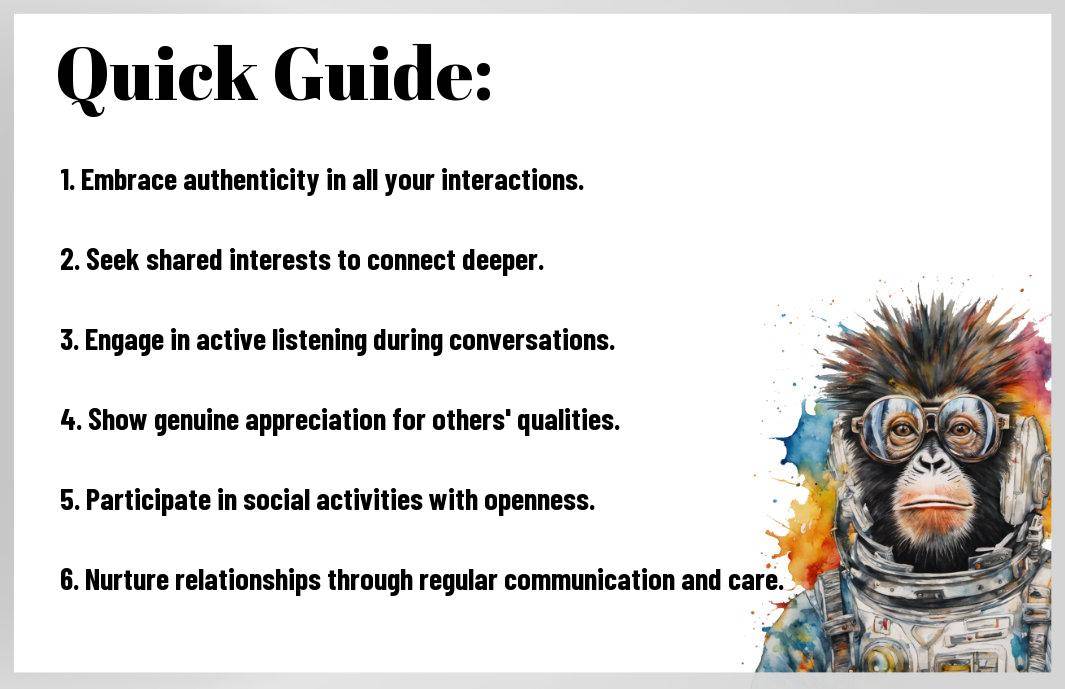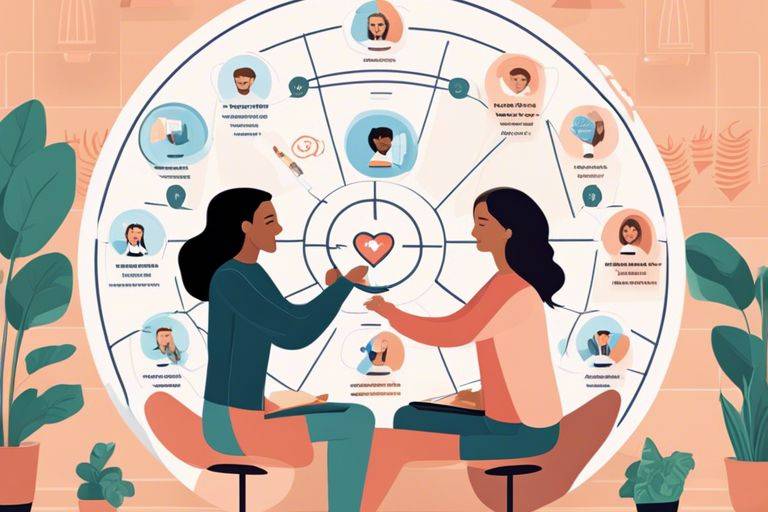Connection means so much to me, and I believe that cultivating meaningful friendships can enrich our lives in profound ways. In this guide, I’ll share my favorite insights and practices that have helped me forge deep, lasting connections with others. Whether you’re looking to create new bonds or strengthen existing ones, I’ll walk you through practical tips to make your friendships truly epicurean, filled with joy and flavor. Let’s explore together how to nurture these relationships and savor the moments that bring us closer!
Key Takeaways:
- Authenticity: Building friendships starts with being your true self, allowing genuine connections to flourish.
- Shared Interests: Engaging in activities and communities that resonate with your passions can lead to meeting like-minded individuals.
- Invest Time: Nurturing friendships requires effort and time, fostering growth and deeper understanding.
- Open Communication: Honest conversations are key to resolving misunderstandings and strengthening bonds.
- Reciprocity: Healthy friendships thrive on mutual support, understanding, and shared experiences.
- Vulnerability: Being open about your feelings and experiences can deepen connection and trust between friends.
- Embrace Diversity: Welcoming different perspectives and backgrounds can enrich your friendships and broaden your horizons.


Understanding Types of Friendships
Your journey to build meaningful friendships starts with understanding the different types of connections we can form. Friendships can vary greatly, and recognizing these distinctions can enhance your social life and help deepen your bonds with others. Here’s a brief overview of the types of friendships you might encounter:
| Type of Friendship | Description |
|---|---|
| Acquaintances | People you know and have casual interactions with. |
| Close Friends | Friends you share personal stories and feelings with. |
| Best Friends | The ones who are always there for you, no matter what. |
| Work Friends | Colleagues who share work-related experiences. |
| Online Friends | Connections made through social media or gaming. |
After differentiating these types of friendships, you can prioritize which relationships you want to nurture based on your own preferences and needs.
Different Levels of Connection
There’s a spectrum of connection when it comes to friendships. Some may start out as casual acquaintances where you see each other occasionally, while others can evolve into deep, lasting bonds. This progression can happen naturally as you invest more time and energy into certain relationships, which helps to enhance the level of intimacy between you and your friends.
As I reflect on my own experiences, I find that building a solid friendship often requires shared experiences, mutual understanding, and respect. Don’t be afraid to explore different levels of connections; you might be surprised at how deep a seemingly casual friendship can grow over time.
The Role of Common Interests
Different hobbies or passions can serve as a bridge connecting us to potential friends. When I meet someone who enjoys the same activities I do, it sparks an instant camaraderie and something to talk about right away. Whether you bond over a love of hiking, books, or even cooking, common interests provide a perfect foundation for furthering the relationship.
To create deep and meaningful friendships, look for opportunities to engage with others through shared passions. By participating in classes, clubs, or social groups tied to your interests, you can naturally attract like-minded individuals. This shared experience not only strengthens the bond but also makes it easier to open up and share more about yourself, which is crucial for any true friendship.
Essential Tips for Nurturing Friendships
You may be wondering how to transform a casual relationship into a meaningful friendship. My experience has taught me that investing time and effort into our connections can pay off immensely. Here are some practical tips I’ve found helpful for nurturing friendships:
- Prioritize regular catch-ups, whether in person or virtually.
- Share experiences, be it a meal, game night, or walking in the park.
- Express gratitude and appreciation; little compliments can go a long way.
- Be open about your feelings and encourage your friends to do the same.
Knowing that friendships require mutual effort and care helps ensure that they grow deeper and stronger over time.
Communication is Key
Any successful friendship thrives on open communication. I’ve noticed that when I actively listen and share my thoughts, it deepens my connection with friends. This means not just waiting for my turn to speak, but genuinely engaging in the conversation. I often find that asking open-ended questions encourages deeper discussions that can solidify our bond. Sharing not just the fun stuff, but the ups and downs of my life helps me feel more in sync with my friends.
Be Present and Engaged
Now, being present and engaged goes beyond just showing up. I try to focus completely on the moment when I’m with my friends. It’s easy to get distracted by notifications or worries, but I make a conscious effort to put away my phone and truly connect with those around me. Eye contact, active listening, and responding thoughtfully show that I value our time together, reinforcing the importance of our friendship.
Another way to enhance engagement is by initiating activities that spark joy and interest. Whether it’s taking a cooking class together or binge-watching a new series, finding common ground in shared interests creates memorable experiences. I make sure to follow up after the event to express my enjoyment, which helps solidify our bond and keeps the conversation flowing. Adaptation and spontaneity in our plans can also lead to unexpected connections, making our friendship even more vibrant.

Step-by-Step Guide to Making New Friends
Once again, forging new friendships can seem daunting at first, but breaking the process down into manageable steps makes it more enjoyable and rewarding. Here’s a simplified approach to making meaningful connections:
| Smile First | Start conversations with a warm smile. It opens doors and makes you approachable. |
| Engage in Conversations | Initiate light-hearted chats or ask questions that show your interest in others. |
| Find Shared Activities | Discover hobbies or activities you both enjoy; this can build a natural bond. |
| Follow Up | After meeting someone new, take the initiative to stay in touch and plan future outings. |
Start with a Smile
Friends often say that a smile can change the entire atmosphere of a situation. When I step into a new social circle, I make a conscious effort to wear a genuine smile. This simple gesture not only conveys friendliness but also encourages others to approach me, making the first step towards connection much easier.
Sparking conversations becomes smoother when you start with a smile. If you look approachable, people are more likely to engage with you, and you may find it easier to strike up a dialogue. I’ve noticed that this small action helps me feel more relaxed, and whether you are at a gathering or a new class, a friendly expression can set a positive tone for your interactions.
Finding Shared Activities
Some of my favorite friendships blossomed from shared interests or activities. When I find myself in a new environment, I look for opportunities to engage in hobbies I enjoy or discover new ones. This not only puts me in touch with like-minded individuals but it also creates a natural flow of conversation. Whether it’s joining a book club, hiking group, or cooking class, having a common activity provides an easy entry point into building friendships.
Step by step, exploring these activities together facilitates organic interactions that can deepen connections. I encourage you to keep an open mind as you search for these opportunities, and don’t hesitate to step outside your comfort zone. You may be surprised at the friendships that form through the shared joy of doing something you both love.
Important Factors in Maintaining Friendships
Despite the excitement of forming new friendships, I’ve learned that the real magic happens when it comes to maintaining these vital connections over time. Friendships require ongoing investment and care to thrive, and there are several important factors to keep in mind as you nurture these relationships. Here are a few key elements I’ve discovered that contribute immensely to sustaining meaningful friendships:
- Trust and vulnerability
- Time and effort
- Communication
- Shared experiences
- Forgiveness and understanding
Knowing how to prioritize these factors can make a world of difference in your friendships.
Trust and Vulnerability
Now that we’re stepping into trust and vulnerability, I can’t stress enough how vital these components are in any friendship. Trust forms the bedrock of strong relationships, allowing you to open up and share your deepest thoughts and feelings. When I find myself able to be vulnerable with someone, it adds a beautiful layer of authenticity to that friendship, and I often feel closer to that person as a result. Having trust means knowing that you can rely on your friend and that they will keep what you share confidential, creating a safe space for both of you.
Vulnerability does take courage, but it’s also incredibly rewarding. I’ve realized that when I express my fears or challenges, it often opens the doorway to my friend doing the same, reinforcing the bond between us. In my experience, it’s these moments of honest sharing that deepen our friendship and create a sense of belonging the way few other experiences can.
Time and Effort
With friendships, time and effort are the lifeblood that keep them thriving. I’ve found that showing up for a friend, whether through a heartfelt message, a shared coffee date, or even a quick phone call to check in, demonstrates my commitment to the relationship. It’s not always easy to carve out time in our busy lives, but I find that the effort I invest in my friendships is often what makes them flourish. Simple acts, like marking important dates on your calendar or planning regular hangouts, reiterate to my friends that they matter to me.
The impact of making time for each other cannot be overstated. When I take the initiative to engage with my friends, not only do I feel more connected, but I also create shared memories that strengthen our bond. It’s amazing how even small gestures, like sending a funny meme or a note of encouragement, can go a long way in cultivating closeness. In the end, time and effort become the threads that weave a lasting tapestry of friendship, turning fleeting moments into cherished memories.
Pros and Cons of Different Friendships
All friendships come with their unique attributes, and understanding the pros and cons can help me navigate my social life more thoughtfully. A well-rounded perspective allows me to appreciate the distinct roles that friends play in my life while also recognizing where challenges may arise. Below is a table that outlines various types of friendships along with their respective benefits and drawbacks.
| Type of Friendship | Pros | Cons |
|---|---|---|
| Childhood Friends | Deep-rooted connection | Limited perspectives |
| Work Friends | Shared goals and understanding | Work-life overlap may lead to tension |
| Online Friends | Less judgment and more openness | Limited physical interaction |
| Acquaintances | Low commitment | Less emotional support |
| Adventure Friends | Fun and exploration | Compatibility issues can arise |
| Creative Collaborators | Stimulating ideas and growth | Possible competitiveness |
| Mentors | Growth and learning opportunities | Potential power imbalance |
| Supportive Friends | Emotional support and security | Can become too dependent |
| Long-distance Friends | Emotional growth through challenges | Difficulty maintaining connection |
The Benefits of Diverse Relationships
Some people enrich my life in ways I never realized until I started diversifying my friendships. By having connections with individuals who have different backgrounds, interests, and perspectives, I find that I grow as a person. Each type of friend adds a unique flavor to my life, helping me see the world through various lenses. This diversity not only enhances my personal experiences but also fosters empathy and understanding, allowing me to connect with a broader range of people.
Moreover, these varied friendships introduce me to new activities, ideas, and conversations that I may not have encountered otherwise. When I step outside of my comfort zone and engage with diverse personalities, I often discover new passions and increase my social resilience. This eclectic mix of friendships helps prevent feelings of boredom or stagnation in my social life, as I can always look forward to something fresh and exciting.
Challenges in Close Friendships
Pros can become cons in close friendships, as the intimacy we share brings both incredible joy and potential stress. The deep emotional investments made in these friendships often lead to misunderstandings and disagreements. I have found that with the high levels of trust and vulnerability present, there can also be increased expectations and emotional demands. When misunderstandings do occur, I must work through them thoughtfully; otherwise, they can escalate and lead to feelings of resentment.
Cons of close friendships often manifest as pressure to maintain consistent communication and emotional availability. When life gets busy, balancing these expectations while nurturing a strong bond can be tricky. Additionally, I sometimes find myself confronting uncomfortable truths about myself or my friend, leading to tension. Ultimately, navigating these challenges may take extra effort, but I believe the rewards of a meaningful friendship make the journey worthwhile.
Common Pitfalls to Avoid
Neglecting Your Friends
Now, when I think about building meaningful friendships, one glaring pitfall stands out: neglecting your friends. It’s easy to get caught up in daily life – work, family, and personal commitments can take my focus off those who truly matter. I believe that friendships need nurturing, much like a garden. If we don’t water them, they can wither away, leaving both parties feeling unvalued and distant. I find it necessary to set aside time for my friends, even when life gets busy, to touch base and show that I care.
Your friends are there to share in the highs and lows of life, and neglecting those connections can lead to feelings of isolation for both of you. I aim to check in regularly, whether it’s a quick text, a phone call, or planning a get-together. These small gestures go a long way in making sure my friends know they are still a priority in my life. After all, the foundation of a strong friendship is built on mutual care and attention.
Miscommunication and Assumptions
One of the biggest stumbling blocks in friendship is miscommunication and the assumptions that often arise from it. It can be so tempting for me to interpret things in a way that fits my feelings or experiences, but that can lead to misunderstandings. I remind myself to clarify intentions and feelings before jumping to conclusions. Taking a moment to check in with my friends about their words or actions can prevent a lot of unnecessary drama.
To truly build strong bonds, I realize that open and honest communication is paramount. This means not only speaking my mind but also being open to listening. Clarifying misunderstandings and expressing feelings can be difficult, but it’s a small price to pay for depth and authenticity in my friendships. By addressing miscommunications head-on, I find that we can grow closer and develop a stronger connection based on mutual respect and understanding.
Final Words
Summing up, I believe that the journey to building meaningful friendships is as enriching as the friendships themselves. Embracing the principles of Epicureanism, I’ve learned to prioritize genuine connections that bring joy, understanding, and support into our lives. It’s about cultivating mutual respect, sharing experiences, and enjoying each other’s company to create lasting bonds. As you seek to deepen your friendships, remember to be authentic and present, as these traits are the foundations of impactful relationships.
If you’re interested in exploring more about the philosophy behind epicurean friendships, I encourage you to check out this insightful piece on the Epicureanism View on Friendships – Syona Gupta – Medium. I hope it inspires you to cultivate the meaningful friendships you deserve, leading to a more fulfilling and joyful life. Happy connecting!
FAQ
Q: What is the purpose of the ‘Epicurean Guide to Building Meaningful Friendships’?
A: The guide aims to provide readers with insights and tools to cultivate deeper, more fulfilling friendships. It emphasizes the importance of authentic connections and offers practical strategies for nurturing relationships that enrich our lives.
Q: Who can benefit from reading this guide?
A: Anyone seeking to enhance their social life and build stronger friendships can benefit from this guide. Whether you’re looking to make new friends or strengthen existing ones, the principles and tips provided are applicable to a range of social situations.
Q: What are some key themes explored in the guide?
A: The guide explores themes such as authenticity, vulnerability, communication, empathy, and the role of shared experiences in strengthening bonds. It encourages readers to reflect on their own relationships and to approach friendship building with intention and care.
Q: Is the guide based on research or personal anecdotes?
A: The guide combines both research-backed insights and personal anecdotes. It draws from psychological studies on relationships while also including relatable stories and examples that illustrate the concepts discussed.
Q: Are there practical exercises included in the guide?
A: Yes, the guide includes a variety of practical exercises and reflection prompts designed to help readers apply the concepts in their own lives. These activities aim to facilitate self-discovery and encourage proactive steps towards cultivating meaningful friendships.
Q: How can I apply the teachings from the guide in my everyday life?
A: You can apply the teachings by starting with small, intentional actions such as reaching out to acquaintances, engaging in deeper conversations, or planning social activities that allow for connection. The guide provides specific strategies to integrate these practices into your routine easily.
Q: Can this guide also help in professional relationships?
A: Absolutely! While the focus is on personal friendships, the principles outlined in the guide can be effectively applied to professional relationships as well. Building authentic connections, fostering trust, and enhancing communication are valuable in both personal and workplace settings.



